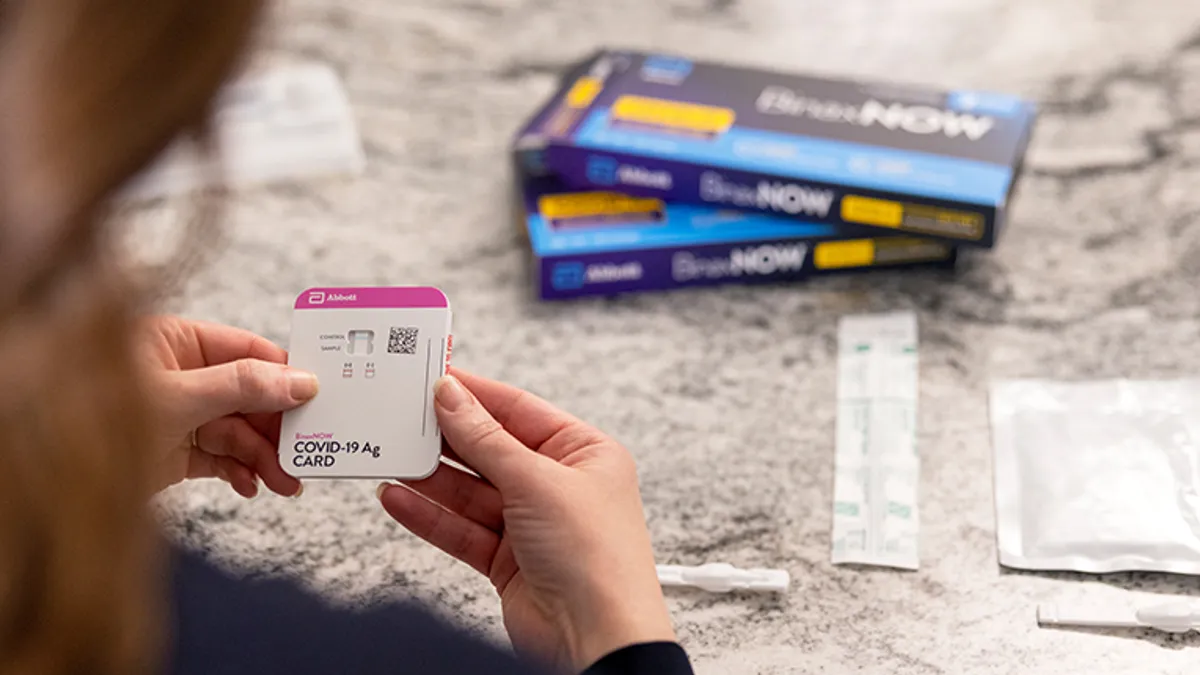Dive Brief:
- A small study funded by NIH has found that COVID-19 antigen testing and PCR tests are equally effective in detecting SARS-CoV-2 infection when used for serial screening conducted every three days. The results are good news for antigen test makers such as Abbott, Becton Dickinson and Quidel.
- PCR tests, which are more sensitive than antigen tests, have been called the gold standard for diagnosing COVID-19 infection for their precision. However, the study published Wednesday in the Journal of Infectious Diseases showed that both testing approaches can give 98% sensitivity when performed regularly as part of a screening program.
- The study's authors, who contend the variation in sensitivity of different diagnostic tests at different stages of infection has not been well documented, concluded that rapid antigen tests performed on par with PCR tests when used every three days. NIH's announcement said the results of the "highly anticipated" longitudinal study, which included 43 adults infected with the virus, suggest that antigen tests "could be a highly effective screening tool to prevent disease outbreaks."
Dive Insight:
While PCR tests are seen as the gold standard for diagnosing COVD-19 infection, cost, lab instrumentation requirements and longer result wait times have limited their use as a screening tool for asymptomatic people. Antigen tests, on the other hand, performed at the point of care or at home deliver immediate results and are less costly than laboratory tests.
However, the limitation for antigen testing has been their perceived less sensitivity, particularly for individuals without symptoms. The NIH-funded study published Wednesday helps to build the case for parity between the test methods with frequent COVID-19 antigen testing recommended as an alternative to PCR tests for serial screening.
Study authors contend they're the first to compare the longitudinal performance of rapid antigen and PCR tests with infectious virus shedding through daily testing early during SARS-CoV-2 infection. Researchers compared PCR testing of saliva, PCR testing of nasal samples and rapid antigen testing of nasal samples.
The diagnostics in the study included an authorized saliva-based PCR test developed at the University of Illinois at Urbana-Champaign, a separate Abbott Alinity PCR test used to obtain results from a nasal swab, and antigen testing was performed using Quidel's Sofia SARS immunoassay.
Though the authors said PCR tests are more effective than antigen tests at identifying infected individuals prior to or early during the infectious period, they concluded when serial PCR testing with rapid results reporting is not possible "frequent serial antigen testing (at least every three days or twice weekly) represents the best alternative."
NIH noted that PCR test results are rarely returned the day of testing and that when it comes to sensitivity the molecular tests continue to detect virus particles when they are most likely no longer transmissible.
"Rapid antigen testing at home, two to three times per week, is a powerful and convenient way for individuals to screen for COVID-19 infection," said Bruce Tromberg, director of NIH's National Institute of Biomedical Imaging and Bioengineering, in a written statement. "With schools and businesses reopening, an individual's risk of infection can change from day to day. Serial antigen testing can help people manage this risk and quickly take action to prevent spread of the virus."
Abbott's BinaxNOW and other antigen tests from Becton Dickinson and Quidel were designed, and early in the pandemic received FDA emergency use authorizations, for use primarily in symptomatic patients. However, in late March 2021, diagnostics from all three companies got EUAs for asymptomatic COVID-19 serial screening.
FDA diagnostics director Tim Stenzel during Wednesday's weekly COVID-19 test town hall said the data from the preprint of the NIH-funded study helped support the agency's antigen serial testing policy change in March.
"That policy was based on that [study] data which was available to us months ago," Stenzel said.
The EUAs granted to Abbott, Becton Dickinson and Quidel were meant to give U.S. schools, workplaces, and communities options for the testing of asymptomatic people when used for serial screening involving repeated tests.
Still, the use of antigen tests in asymptomatic individuals remains controversial due to a high rate of false negatives that might nullify the benefits of mass testing.
A CDC study released in January found that Abbott's rapid point-of-care BinaxNOW antigen test may miss nearly two-thirds of COVID-19 infections in people without symptoms. FDA in November also issued an alert that false-positive results can occur with antigen tests.
Nonetheless, FDA's Stenzel on Wednesday said "with any tests" including molecular diagnostics there can be false negatives and false positives with "a lot of variability contingent on sample collection." He also noted that test performance can be negatively impacted in a "low-incident population" no matter what the test.
The diagnostics industry has recently reported a softening in demand for COVID-19 tests due to vaccines, with sales at Becton Dickinson and Quidel falling short of analyst expectations in their latest earnings. Abbott last month cut its 2021 outlook blaming a sharp decline in demand for its coronavirus-related tests on global vaccination efforts.











